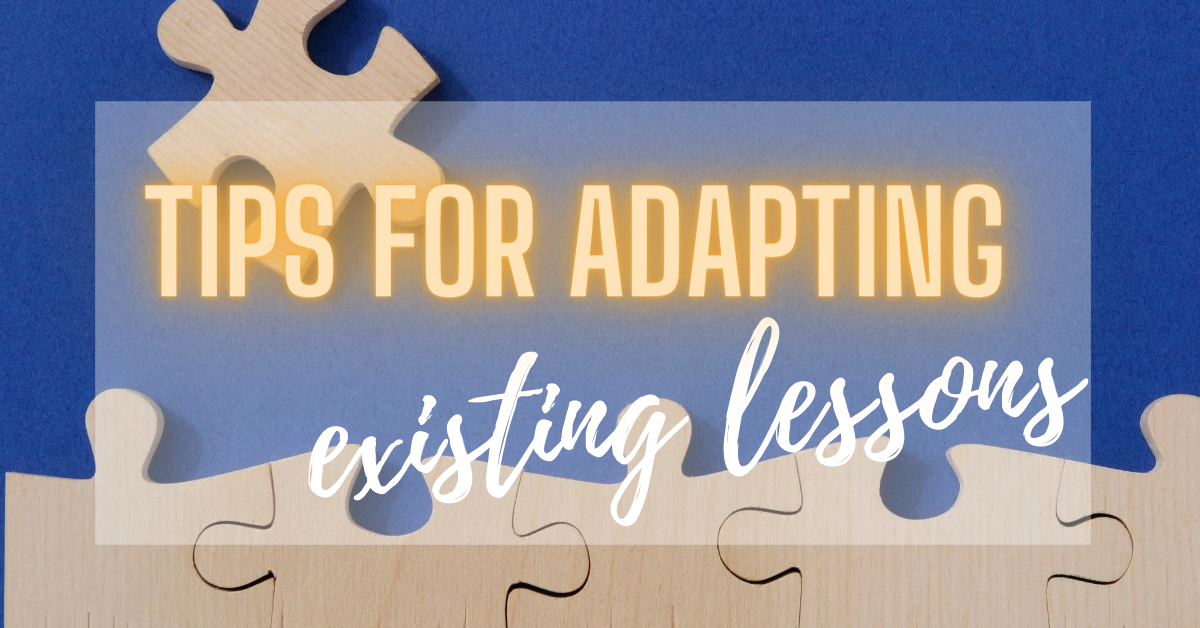Tips for Adapting Lesson Plans to the Virtual Classroom
Drama isn’t always the easiest subject to adapt to distance learning. So much of what makes drama fun and worthwhile involves human interaction. Seeing students engage with one another, create connections, and interact as a group while exploring different ways to use their bodies, minds, and imaginations is what drama class is all about. But don’t despair – we’re here to help with some tips to make your life easier when adapting your lesson plans to the virtual classroom.
1. Start with what you have.
You don’t need to reinvent the wheel and create a whole set of new lessons for the virtual classroom. Look at your current lesson plans and think about whether your students could do the assignments in their homes, with limited resources. Consider how you could present your material in different ways. Can you present the lesson verbally via a video conferencing app? Could you record yourself giving the lesson and make it into a private YouTube video for your students? Do you have lectures or notes that you could convert to articles, worksheets, or PowerPoint presentations, so students can study the material on their own time and at their own pace? Do you have homework assignments or ISPs that you could turn into lessons? The good thing is that once you have adapted the lessons you already have, you can use them again with future classes.
2. Begin with projects that students can do individually.
Go easy on yourself and start by considering lessons, exercises, and assignments that lend themselves to individual work and study. Playwriting, monologues (reading, writing, performing), theatre history, research projects, analysis (scene, line, song, character), design work, business of theatre exercises, theatre trivia, compare and contrast exercises, journaling and reflections can all be completed individually and submitted via email or your school’s virtual classroom program. These projects can be written assignments, video assignments (either performed live or recorded), or a combination of both.
3. Group work is definitely doable!
While individual studies are useful, we don’t want to limit ourselves and our students to only independent study. Reading scripts aloud as a full group can be a lot of fun. Full class breathwork, mindfulness activities, and visualization exercises are all beneficial for students both during drama class and in their outside lives. If your platform supports breakout rooms, you can divide students into smaller groups. You can do class brainstorming and discussion over video conferencing, but you’ll need to come up with a signal to ensure students don’t interrupt each other.
You can do full group improvisation exercises such as Word at a Time Story by assigning the order of participation in advance (e.g., in alphabetical order – this also is a great way for students to practice coming in for their cues!). You can do improv exercises that require pairs, such as Job Interview and Scenes from a Bag, by having two students do the exercise while other students observe – just like in the physical classroom. Note: some students are more self-conscious on camera than they are in person. One option is to have those watching turn off their cameras during presentations.
Choral work or group singing exercises can be challenging due to microphone and video lag, but depending on your technical abilities, you may be able to have students use a click track or backing track to keep them at the same tempo, and have them record their parts for you to edit together. Live choral work over video conferencing technology is difficult due to differences in internet, video, and audio speeds.
When planning smaller group work, try to avoid assignments that require a specific number of students. It can be difficult to know whether students will show up for virtual classes, so whenever possible, ensure that the number of students required for the exercise is flexible.
4. Use new challenges to your advantage.
A great problem-solving exercise can come from figuring out solutions to new theatrical challenges in the current global situation, or problems that may arise post-pandemic. For example, how could a director stage the spit-take scene in The Drowsy Chaperone without actually having a student spit water in another student’s face? How could someone directing a fairy tale play stage a scene that requires “true love’s kiss to break the spell” while having to follow physical distancing requirements? What would you do during a Zoom production if someone’s internet connection breaks mid-scene, or someone’s microphone stops working?
Have students brainstorm a list of new theatrical production challenges, and then come up with ideas on how to solve them.
5. When in doubt, simplify.
As much as possible, avoid assignments that require a lot of extra materials – art supplies, props, costume items, stationary, etc. Not all students have access to lots of different supplies in their homes, or the ability to go out and buy supplies. You’ll need to provide access to readings, scripts, and audio/video examples if you use them. Remember that some students may have to share devices with siblings or parents or have old or outdated technology that lags, so as much as possible, leave some wiggle room for technical issues. For example, be aware of whether aural clarity issues are due to a student actually having trouble with their volume and diction, or they’re just dealing with a crappy microphone that sounds tinny in their living room.
Try to look at lesson adaptation as an opportunity to refresh your materials, challenge yourself to come up with creative staging solutions (only this time your stage is your virtual classroom), and focus on the topics you really enjoy teaching. Focusing on the topics that bring you the most joy will make the adaptation process easier, because you will be more engaged and determined to make it work. You can do this!
And don’t forget, there are lots of resources available at the Theatrefolk distance learning page. We’re here to help!
Related Articles
Create Your Own Choice Board: Drama Activities
by Lindsay Price
Choice boards give students the opportunity to choose how they want to learn a particular subject. Create Your Own Choice Boards: Drama Activities can help encourage your students' independence by allowing them to take an active role in their learning.
Distance Learning
by Christian Kiley
A play about trying to survive and thrive in a virtual classroom.





